Janine Jackson interviewed academic and writer Gregory Shupak about how to deny Gaza genocide for the October 10, 2025, episode of CounterSpin. This is a lightly edited transcript.
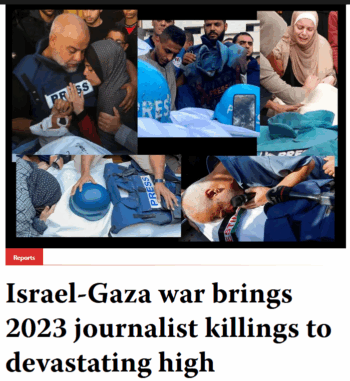
Committee to Protect Journalists (2/15/25)
Janine Jackson: The Committee to Protect Journalists states that in the first 10 weeks after the October 7, 2023, Hamas attacks, Israel had already killed more media workers in Gaza than had ever been killed in a year anywhere. Israel has systematically targeted journalists and their families for reporting the realities of genocide, famine and displacement, with the murders often followed by official PR efforts depicting the journalists as Hamas propagandists, or simply as “terrorists.”
Journalists are civilians; killing them is a war crime. One would hope that, minimally, the rest of the world’s journalists would acknowledge that, and decry the unlawful, targeted erasure of those trying to bear witness to what is widely acknowledged as genocide, trying to show the world what only they can show. US news media, with all the resources and platform to lift up that reality, are running away from the responsibility, and worse.
Our guest has been following it all. We’re joined now by academic and writer Gregory Shupak, author of, among other titles, The Wrong Story: Palestine, Israel and the Media, from OR Books. He joins us now by phone from Toronto. Welcome back to CounterSpin, Gregory Shupak.
Gregory Shupak: Hi, thanks for having me.
JJ: In August, Israeli military openly killed six journalists sheltering in a tent. They then accused one of them, Al Jazeera‘s Anas Al-Sharif, of being a terrorist. They had harassed him for months with phone calls explicitly telling him to stop reporting, and then an airstrike killed his father. They didn’t bother justifying the murder of the other five journalists.
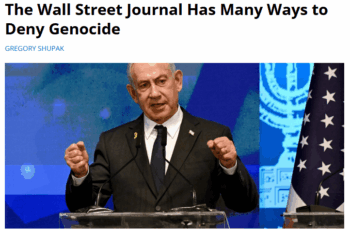
FAIR.org (10/9/25)
Just as it’s increasingly clear that Israel is carrying out a genocide, it’s clear that that includes a plan to silence those who would show that to the world. You just wrote for FAIR.org about one outlet, the Wall Street Journal, but it’s emblematic of techniques that many corporate news outlets are using to deny what we all can see with our own eyes. Talk, if you would, about some of the methods that you see—which, to be clear, they wouldn’t use if they weren’t effective to some degree.
GS: Yeah, absolutely. And it’s worth keeping in mind that this type of propaganda doesn’t have to necessarily convince the audience to completely accept the point of view being put forth. Rather, it can still be effective if it merely disorients and confuses the audience, because that renders readers without the kind of clarity required to take political action.
So, yeah, I’ve identified in this piece five tactics that the Wall Street Journal has used over the last few months in its explicitly genocide-denying commentary on Gaza. And I do think, as you suggested, that this is much more widespread than, well, certainly than just this one period in the Journal, but also in a much larger range of outlets over the last two years. And so the five tactics that I’ve identified are hand-waving, victim-blaming, inverting perpetrator and victim, obscurantism and repudiation. So let me just try to briefly define each one.
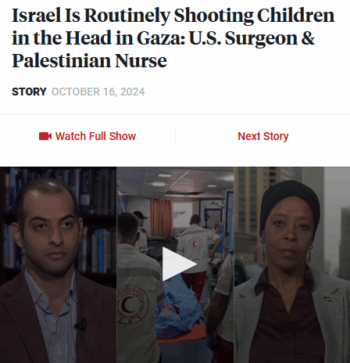
Democracy Now! (10/16/24)
So with hand-waving, you have the author just brushing aside the horrors that we’ve all, as you’ve said, seen with our own eyes, as just, “Oh well, this is the inevitable nature of war. What are you going to do? There’s no way this can be avoided,” as if it were a law of physics to burn people alive in their tents, or deliberately target children with snipers, as many doctors have observed has happened in Gaza.
Victim-blaming, another tactic I mentioned, is where the blame or responsibility for the mass murder of Palestinians is put on Palestinian resistance groups such as Hamas. So you have here observers suggesting, “Well, it’s the Palestinians’ use of human shields that results in so many Palestinians being killed by Israel.” In fact, the record shows that there’s far, far, far more documented cases of Israeli forces using Palestinians as human shields than there are of Palestinians using each other as human shields. In fact, there’s effectively no evidence of that having happened, certainly not at any kind of large scale, or as a kind of consistent approach to war-fighting.
The third approach I point to is inverting perpetrator and victim. So this is where you see Palestinians portrayed as the genocidal ones, where the commentary suggests, Well, Palestinians, they would carry a genocide if they could, as one observer put it in the Journal, Israel can carry out a genocide and supposedly isn’t.
Of course, as with all of these forms of genocide denial, there is no actual factual record to support what these authors are saying. In fact, evidentiary record suggests exactly the opposite.
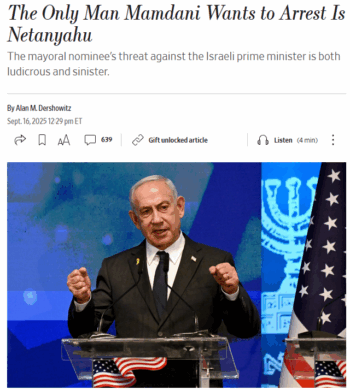
Wall Street Journal (9/16/25)
Obscurantism, the fourth type of genocide denial that I look at, is where the author offers questionable pieces of information, and presents them typically in a decontextualized way, as if Israel should be understood as actually going out of its way to pursue its goals in a humane fashion, consistent with international law. So you have authors spewing nonsense about “Oh, well, Israel allows in aid,” or “Israel warns people,” etc., etc., none of which stands up to scrutiny, as I explained in the piece.
And then, lastly, there’s repudiation, and here’s where the authors simply say X or Y isn’t true, and they just don’t really bother offering any counter evidence. So we have, of all people, Alan Dershowitz in the Journal recently saying that it’s preposterous for [New York City mayoral candidate Zohran] Mamdani to say that he would have [Israeli Prime Minister Benjamin] Netanyahu arrested for genocide if he were to come to New York and Mamdani were mayor. And so Dershowitz just dismisses it as outrageous to say that Israel has committed genocide, actually, as if there were not some mountain upon mountain upon mountain of evidence proving that it has carried out a genocide for two years.
JJ: Absolutely. I just saw a video of Tom Cotton simply stating, “There’s no famine in Gaza,” just declaratively. “There’s no famine in Gaza, and anyone who tells you there is lying.”
I saw a video of a history teacher talking about the new “slavery wasn’t that bad” line that we apparently are going to have to deal with in 2025. And she had a student who said, “Well, aren’t the terrible stories we hear coming from escaped slaves? We don’t hear from the ones who were happy, and maybe that would give us a different view.” And the teacher said, “Actually, our understandings of the horrors of slavery don’t come from enslaved people themselves, but from slave owners, who published, essentially, torture manuals.”
With Israel, we hear media apologists saying it’s ridiculous and terrible and unforgivable to accuse Israel of intentions and ideas that Israeli officials are on record stating openly. That is some peak denialism.
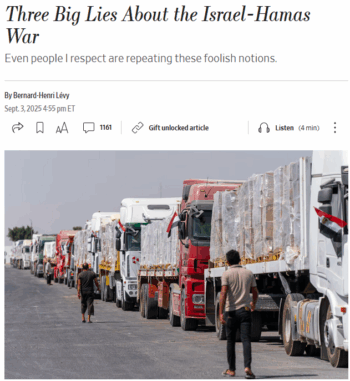
Wall Street Journal (9/3/25)
GS: Yeah, that’s a good point. And that’s one of the things that comes up in the piece is—OK, I can’t believe in one day I had to read Alan Dershowitz and Bernard-Henri Lévy, the French public intellectual. That was like having a dentist appointment and then driving directly to have a prostate exam.
And so Lévy, he claims that, well, for there to be a genocide, there has to be a plan to destroy a people. And he says Israel does not have any such plan. I mean, it’s astonishing that people even can say such things, much less that they somehow get into print, and past whatever integrity-free people are editors at the Wall Street Journal, because anybody with a search engine can find one statement after another by Israeli political and military officials, especially political officials, saying quite explicitly that their plan is to carry out actions that are well within the definition of genocide, from the very start.
For example, we have the infamous statement from [then–Minister of Defense] Yoav Gallant about saying he’s going to implement a total siege of Gaza. We’ve had Netanyahu saying that Israel was going to only agree to cease hostilities if it were tied to Trump’s genocidal plan to make Gaza into a plaything for international tourists. Things like Gideon’s Chariots, which is a plot that Israel is seeking to implement as of May, which just involves destroying the remnants of Gaza’s civilian infrastructure and concentrating the Palestinians into, well, concentration camps. This was denounced as genocidal by Human Rights Watch.
So there’s one articulation after another of Israeli leaders saying, “Yes, we are going to do these genocidal things.” And yet you have a supposed intellectual, Lévy, just dismissing the idea that Israel has had genocidal plans. They themselves have told us very clearly over and over that they have such plans.
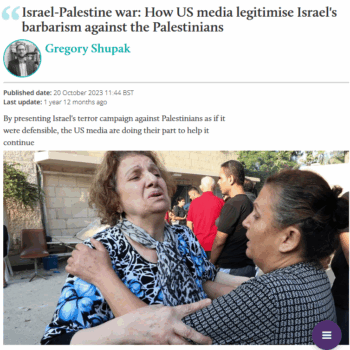
Middle East Eye (10/20/23)
JJ: And with statements saying “There are no innocents in Gaza,” and other statements that are declarations about the nature, the way that certain Israeli officials look on Gazans, that suggests that they are subhuman. And in October 2023, you were noting in Middle East Eye that outlets like the Washington Post were even then criticizing as “unacceptable equivocation” just the very idea that the Hamas attack should be seen in a historical and political context. Suggesting that Palestinian actions have no historical context, no political context, removing them from history—that seems to me like a key part of dehumanization.
GS: So the way that I would characterize it, and have across various things I’ve written in these past two years, is that in the early phases of the genocide, you had US media carrying out what I would call incitement to genocide, and then shifting later to genocide denial. So in those early days, you had the really rabid dehumanization of Palestinians, and indeed decontextualization of the actions of Hamas and other armed groups on October 7.
The New York Times editorial board, as I recall, said something along the lines of, the attack occurred without “any immediate provocation.” Again, I may be slightly off in the quote, but it was roughly that.
And first of all, just the mere fact that there has been a siege on Gaza since 2006, 2007, depending on how you define “siege” and when this one began, but the point is that it is an immediate, omnipresent provocation. As is the fact that most people who reside in Gaza are there because they’ve been expelled from other parts of Palestine. That is an omnipresent and therefore, on October 7, immediate provocation.
And then you had all kinds of violence being enacted throughout that year against Gaza, and other parts of Palestine in which Palestinians reside. So you had Palestinians being shot at the security wall through which they broke on October 7 in the days leading up to it. You had children killed at record levels in the West Bank by Israeli forces that year. You had Israeli forces bombing Gaza in the months leading up to October 7.
So there’s a very, very, very rich documentary record of provocation, to put it mildly. So for the Times to have said that there was no immediate provocation is really jaw-dropping.
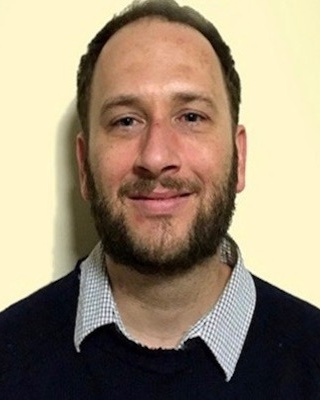
Gregory Shupak: “It’s necessary…for this genocide to unfold, to have the American public either ginned up for the violence, or confused about it.”
And that kind of decontextualization makes it seem as if Palestinian violence, or Palestinian recourse to armed force, is just illegible. Just makes no sense, right? This is what Max Boot was writing in the Washington Post; he was saying you can’t even expect Hamas to operate according to any sort of political logic. They’re like ISIS and Al-Qaeda.
It was to reduce Palestinians and their representatives and their fighters to just irrational, bloodthirsty savages. And the message behind that is not difficult to discern. It’s these people are violent animals and they cannot be negotiated with, they can only be killed. They do not deserve rights because they are not human. And so that was really widespread in the early days of the post–October 7 world.
And, eventually, as the scale of Israeli crimes became more and more visible, you had a lot of the propaganda organs adopt various forms of genocide denial, once the genocide that they helped ignite was already up and running. Because it’s important to underscore that, of course, Israel could not do what it’s done without US support. So it’s necessary, for these events to unfold, for this genocide to unfold, to have the American public either ginned up for the violence, or confused about it and thus unable to see what’s happening and try to oppose it. That’s just as important as it is to whip Israeli society into a frenzy, to enact this sort of barbarism that we’ve seen inflicted in Gaza.
JJ: I could talk to you much longer, and I’m sure I will in future, including about the so-called “peace plan,” where the New York Times is saying it’s such an integral part of that peace plan that it’s going to help develop Gaza into a de-radicalized terror-free zone that does not pose a threat to its neighbors, right? So we’re going to put a pin in that.
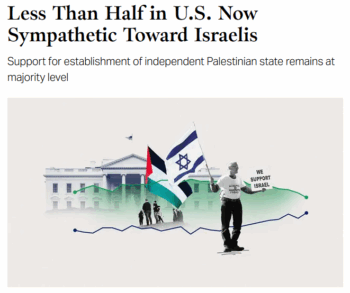
Gallup (3/6/25)
But I want to ask you, finally: We do see, against all of this, we still see opposition to the genocide increasing: Gallup has a poll, US sympathy for Israel is at an all-time low, below 50% for the first time in the 25 years that Gallup has been doing this polling. I feel like the question is becoming less “how do we convince people to oppose genocide” and more “how do we create the circumstances where that opposition becomes power?”
And so I just want to leave you with the question of, it’s amazing to me that people, in the face of this PR onslaught, are believing what they see with their own eyes, and they’re acting on that. But what else needs to happen, and just what are your thoughts about going forward, and turning what many folks understand into real change?
GS: To me, what I take from history is that it can only be accomplished through painstaking and often unglamorous political organizing. I think this is how, or a huge part of how the Israeli narrative, the US/Israeli narrative, has lost its grip is, yeah, sure, it’s that people can share videos that independent Palestinian journalists have taken. You can share that online. Absolutely. That’s a key part of it. Nevertheless, it is also a very key part of developing a counter narrative to have organized activists who do things like share information to debunk all the lies, who hold teach-ins, who distribute their own literature, electronically and the old-fashioned way.
So I think that the only way to stop the US/Israeli genocide machine is fundamentally not that different from asking how it was possible to get the Voting Rights Act in the United States, or how it was possible to end the Vietnam War in the United States, or perhaps, most aptly, how it was possible to bring apartheid South Africa to its knees. These things happen, I think, typically at a slower pace than any of us would like, because grassroots organizing doesn’t have the resources that the ruling class does, obviously. So it requires tremendous people power, but people just getting together and forming political organizations, and linking up with other political organizations, and strategizing according to local conditions—that’s the way that these kinds of emerging consensuses can be translated into real-world change.
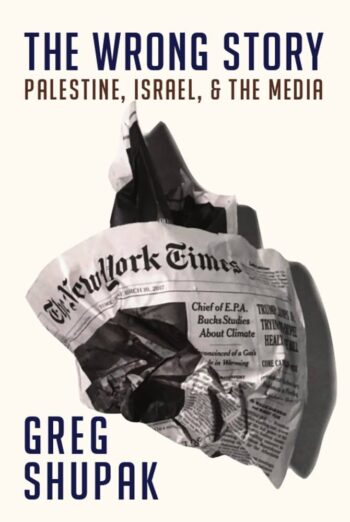
OR Books (2018)
And I think that that’s the trajectory in which things seem to be headed. History doesn’t move in a linear way, so we don’t know what the future of Palestine will look like, but it does seem like Israel and its American backers have forever lost world public opinion on this issue. And there are large, large swaths of the populations around the world who have made resisting the oppression of the Palestinians as much a part of their daily lives as going to get the groceries or taking their dog for a walk.
So it does, of course, wear one down and cause excruciating pain to see just the relentlessness of US/Israeli cruelty in Gaza. But there is, at the same time, tremendous reason for hope and optimism, first and foremost, because of the resilience of the Palestinians themselves and their regional allies, but also because of just ordinary people around the world who don’t want to stand for this, and won’t take it lying down.
JJ: We’ve been speaking with academic and writer Gregory Shupak. The book The Wrong Story: Palestine, Israel and the Media is available from OR Books. Gregory Shupak, thank you so much for joining us this week on CounterSpin.
GS: Ah, thank you!
This post was originally published on FAIR.